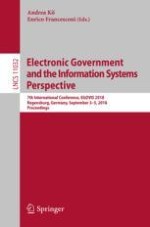This book constitutes the refereed proceedings of the 7th International Conference on Electronic Government and the Information Systems Perspective, EGOVIS 2018, held in Regensburg, Germany, in September 2018.
The 19 revised full papers presented were carefully reviewed and selected from 22 submissions. The papers are organized in the following topical sections: digitalization and transparency; challenges in e-government technology and e-voting; knowledge management in the context of e-government; semantic technologies and the legal aspects; open data and open innovation; and e-government cases - data and knowledge management.
